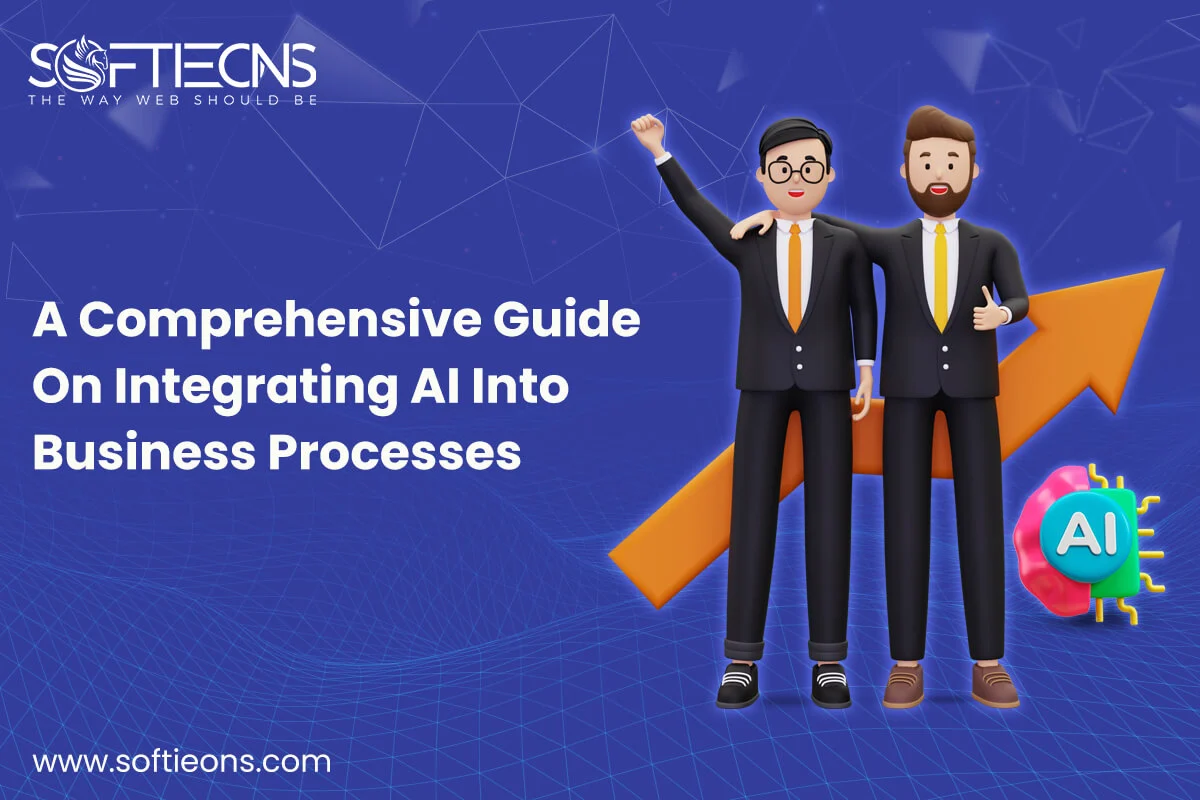A Comprehensive Guide On Integrating AI Into Business Processes
Thu, 29 Feb 2024
Business Processes with Artificial Intelligence (AI) have become a transformative pressure in diverse industries, revolutionizing the manner businesses perform and making processes extra efficient. As agencies increasingly understand the capability of AI, integrating it into their commercial enterprise processes has ended up a crucial step closer to staying aggressive within the digital age. This comprehensive guide explores the important thing elements of integrating AI into commercial enterprise techniques, supplying insights into the advantages, demanding situations, and concerns for a hit implementation. From expertise exclusive AI technology to making sure facts security and evaluating ROI, this manual objectives to equip businesses with the knowledge and techniques needed to harness the energy of AI and optimize their operations.
Introduction to AI integration in enterprise strategies
Definition and significance of AI integration
AI integration is the procedure of incorporating artificial intelligence technology into various enterprise procedures to decorate performance, accuracy, and choice-making abilities. AI integration holds substantial significance in today's aggressive enterprise panorama as it gives the potential to convert operations, improve customer stories, and force innovation. By automating repetitive responsibilities, studying huge amounts of information, and offering precious insights, AI integration can help businesses stay ahead of the curve and gain a competitive part.
The current landscape of AI adoption in agencies' Business Processes
AI adoption in organizations has been rapidly growing, with groups across industries recognizing its potential. According to a survey by way of Gartner, 37% of businesses have carried out AI in some form, a 270% growth during the last four years. From chatbots and digital assistants to predictive analytics and recommendation systems, AI is being leveraged in areas with customer service, supply chain management, advertising, and more. However, despite the growth, there's nonetheless extensive room for corporations to explore and combine AI technologies further.
Benefits and challenges of AI integration with Business Processes
Advantages of AI integration in enterprise strategies
Integrating AI into commercial enterprise methods brings numerous advantages. Firstly, it can automate repetitive and mundane duties, permitting personnel to be cognizant of extra strategic and creative paintings. Secondly, AI can examine vast quantities of records quickly, permitting organizations to make statistics-pushed choices, perceive patterns, and discover precious insights. Additionally, AI-powered structures can beautify customer reports by using personalizing interactions, enhancing suggestions, and imparting green assistance. Lastly, AI integration can drive operational performance, reduce prices, and increase productiveness.
Common challenges and obstacles in AI integration
Despite the benefits, there are challenges groups can also face while integrating AI. One key undertaking is the supply and pleasant of records. AI structures closely depend on statistics, and groups ought to make certain they've got entry to easy, applicable, and diverse datasets. Another mission is the lack of AI expertise and abilities inside organizations. Training employees or hiring experts with AI understanding may be important to efficiently imposing and keeping AI systems. Lastly, ethical concerns consisting of bias, privacy, and security ought to be addressed to agree with and make certain responsible AI integration.
Understanding special AI technology for commercial enterprise strategies
Machine gaining knowledge of and its packages in commercial enterprise
Machine studying is a subset of AI that allows systems to study and improve from enjoyment without being explicitly programmed. In business, device getting to know can be carried out in diverse approaches, which include predictive analytics, fraud detection, demand forecasting, and personalized recommendations. By reading patterns in data, machines gaining knowledge of algorithms can make accurate predictions and automate selection-making strategies.
Natural Language Processing (NLP) and its importance in Business Processes
Natural Language Processing (NLP) specializes in the interaction between computers and human language. Its programs in business procedures encompass chatbots, voice assistants, sentiment evaluation, and language translation. NLP permits agencies to apprehend and respond to client inquiries, analyze patron feedback, and extract precious insights from unstructured data sources such as social media or patron critiques.
Computer vision and its function in business procedures
Computer imagination and prescience entail the analysis and interpretation of visible records, enabling machines to apprehend and interact with the visible world. In enterprise, PC vision technology can automate high-quality management in production, and enable facial popularity for safety functions. Help in stock management via item reputation, and enhance augmented fact reviews. By allowing machines to "see," computer vision expands the opportunities for automation and shrewd choice-making.
Key concerns for a successful AI integration in Business Processes
Aligning AI approach with commercial enterprise goals
Before integrating AI, a comprehensive guide companies should align their AI approach with their normal enterprise goals. It is important to become aware of particular regions where AI can add cost and prioritize integration efforts for that reason. By having a clear knowledge of the desired outcomes and blessings, businesses can make knowledgeable choices approximately the AI technology to adopt and the assets required for successful integration.
Building a sturdy basis of facts infrastructure
Data is the gasoline that powers AI integration, and agencies need to invest in constructing a robust basis of facts infrastructure. This includes ensuring facts nice, establishing statistics governance practices, and implementing robust facts storage and control systems. By having a reliable and handy data infrastructure, companies can leverage AI effectively and derive significant insights from their statistics.
Addressing the capabilities hole and group of workers' training in Business Processes
To integrate AI efficaciously, businesses should address the abilities hole and spend money on a group of workers' education. Training employees on AI technologies and facts analytics. System learning can allow them to maximize the potential of AI systems and make contributions to their improvement and preservation. Additionally, corporations can also want to recollect hiring professionals with AI information or partnering with external experts to fill the abilities hole and ensure a smooth integration process.
Implementing AI in precise business functions for Business Processes
AI integration in customer service and support
AI has revolutionized customer support and aid by supplying efficient and customized help. Chatbots powered by way of AI algorithms can handle common purchaser inquiries, releasing human marketers for more complicated tasks. With comprehensive guide AI, organizations can offer 24/7 guidance, brief response instances, and customized suggestions, enhancing the general client experience.
Optimizing AI for advertising marketing and income processes
AI can supercharge advertising marketing and sales efforts by studying troves of records to pick out purchaser choices and behavior styles. By leveraging AI-powered analytics tools, corporations can generate targeted marketing campaigns. Optimize pricing techniques, or even expect customers to shop for styles. This not only increases conversion rates but also boosts sales and enhances customer pride.
Enhancing delivery chain and logistics with AI with Business Processes
Integrating AI into the supply chain and logistics processes can lead to widespread upgrades in performance and price effectiveness. AI algorithms can examine information from various sources to optimize inventory management, streamline routing and delivery, and decrease delivery chain disruptions. From call for forecasting to direction optimization, AI empowers agencies to make information-pushed choices and function with more precision.
Ensuring facts protection and ethics in AI integration
Privacy worries and policies in AI integration
As corporations include AI, it is essential to cope with privacy worries and follow relevant regulations. Safeguarding customer statistics and ensuring compliance with records safety laws is important. Implementing strong safety features, obtaining proper consent for facts usage, and developing obvious privacy policies are essential steps to construct accept as true, and keep moral AI integration.
Ethical considerations in AI usage
Ethical issues in AI integration consist of averting bias, ensuring equity, and being liable for algorithmic selections. Businesses need to actively paintings toward mitigating bias and discrimination in AI systems to prevent unintentional results. Ethical pointers and frameworks can assist agencies navigate the challenges and ensure ethical practices in AI integration.
Implementing strong statistics governance practices
Data governance plays an important position in AI integration. Establishing clear records ownership, statistics excellent requirements, and statistics access controls are critical for ensuring the accuracy and reliability of AI algorithms. Implementing information governance practices now not only improves AI performance but also builds acceptance as true with stakeholders and strengthens facts protection.
Evaluating the ROI of AI integration in Business Processes
Measuring the effect of AI on business overall performance
To examine the ROI of AI integration, companies want to determine its impact on diverse overall performance metrics. This includes assessing improvements in operational performance, consumer pleasure, sales growth, and fee financial savings. By tracking these metrics, businesses can advantage of insights into the tangible blessings derived from AI integration.
Calculating the go-back on funding (ROI)
Calculating the ROI of AI integration entails evaluating the prices related to implementing and preserving AI systems towards the monetary profits performed. This consists of elements like preliminary funding, education costs, and ongoing preservation expenses. By accomplishing an intensive value-gain analysis, companies can determine the general fee AI brings to their operations.
Identifying key overall performance signs (KPIs) for AI integration
Identifying applicable KPIs is vital for comparing the success of AI integration. These may want to consist of metrics such as reaction time in customer support, conversion quotes in advertising, or inventory turnover in supply chain management. By setting clear KPIs and often monitoring development, groups can tune the effectiveness of AI integration and make vital adjustments.
Future trends and advancements in AI integration for corporations
Emerging technologies shaping the destiny of AI integration
The future of AI integration holds thrilling possibilities with emerging technologies technology like natural language processing, PC imaginative and prescient, and deep mastering. These advancements will allow more advanced automation, customized studies, and smarter choice-making. Understanding that technology and exploring their capacity packages could be critical for businesses to live competitively.
Predictions for AI's impact on business methods in Business Processes
AI's impact on enterprise approaches is expected to continue developing exponentially. From automating recurring responsibilities to unlocking new insights from statistics, AI will rework how companies operate. Predictive analytics, smart automation, and more advantageous personalization become fashionable exercises, permitting companies to optimize procedures, enhance performance, and deliver awesome client stories.
Strategies for staying beforehand within the AI integration panorama
To stay in advance within the AI integration panorama, organizations want to foster a way of life of innovation. Invest in skills development, and foster partnerships with AI specialists. Embracing a boom mindset and proactively exploring AI packages applicable to their enterprise will allow companies to capitalize on the opportunities presented by using AI. By staying agile and adaptable, groups can ensure they're at the leading edge of AI integration.
In conclusion, integrating AI into commercial enterprise strategies gives immense potential for organizations to beautify efficiency, productivity, and decision-making. The journey in the direction of successful AI integration can also include demanding situations. Groups that navigate those hurdles and embrace AI stand to gain a competitive area in the modern-day rapidly evolving panorama.
By staying informed about ultra-modern AI comprehensive guide technologies, considering ethical and information safety implications, and evaluating the ROI. Companies can liberate the total ability of AI integration and pave the way for a destiny of innovation and boom. Embracing AI is no longer a choice, however a need for groups trying to thrive in the virtual technology.
POPULAR POSTS
Shopify vs. WordPress: Which one is best for e-commerce?
Wed, 07 Apr 2021Role of IoT in the Real Estate Industry
Wed, 14 Apr 2021Why UX And UI Is Important For Mobile Application Development
Sat, 01 May 2021Telemedicine's Advantages in Nursing Homes
Fri, 24 Dec 2021RECENT POSTS
PHP & Laravel Web Development | Build Secure & Scalable Websites
Thu, 18 Dec 2025Why Every Business Needs a Mobile App Today
Thu, 18 Dec 2025Title: Run Your Entire Real Estate Business From Your Phone
Fri, 12 Dec 2025









